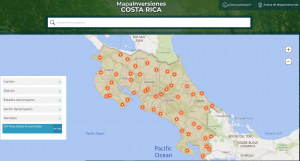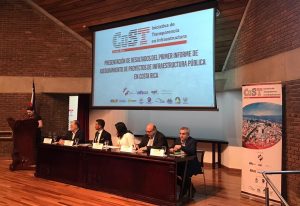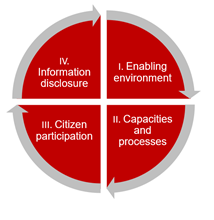Member since 2017
Public infrastructure in context
In 2019, Costa Rica’s economy was ranked 62nd globally on the World Economic Forum Global Competitiveness Index, while Transparency International’s Corruption Perceptions Index placed it 42nd globally in 2020, with a score of 57/100.
Costa Rica’s commitment to transparency was enshrined in its second Open Government Partnership (OGP) National Action Plan.
Latin America, including Costa Rica, suffers from a severe lack of investment in infrastructure. The region has an estimated infrastructure investment gap of around 2.5% of GDP, or approximately $150 billion USD per year. In addition to investment challenges, bureaucracy and inefficiencies have been highlighted as impediments to the development of public infrastructure for social and economic growth.
The National Survey of Perception on Prevention of Corruption (ENPPC) carried out by the General Comptroller of the Republic in 2017 and 2020 revealed key insights into the infrastructure sector:
- infrastructure is the third largest sector in public procurement, totalling 11.7% of procurement procedures;
- 66% of officials surveyed were unaware of any corruption risk assessments carried out in their departments;
- 86% of citizens interviewed believe that Costa Rican society is tolerant of corruption;
- 64% of citizens interviewed believe that the public sector is mainly responsible for preventing corruption.
CoST Costa Rica: How it all began
Costa Rica was one of the six participating countries in the 2015 CoST Latin America multi-stakeholder workshop. The Costa Rican participants worked together to explore CoST principles and develop an action plan for infrastructure transparency. Following the workshop, Costa Rica redrafted its ‘Transparent Infrastructure’ commitments under the National Strategy for Open Government (based on its OGP National Action Plan) to align with CoST principles.
Participants continued to drive forward the agenda for infrastructure transparency at the national level after the workshop, as highlighted in this blog from the Ministry of Public Works and Transport’s former Vice Minister for Reform, Mauricio Gonzalez.
On 27 March 2017, CoST Costa Rica was officially launched at a public ceremony featuring representatives from government, industry, and civil society. Ana Helena Chacón Echeverría, Vice President of Costa Rica, signed the Memorandum of Understanding, which committed to strengthening transparency and accountability in public infrastructure.
Costa Rica’s CoST membership forms part of the country’s plans for OECD accession, bringing its national policies and practices closer to those at an international level.
Multi-stakeholder working
CoST brings together stakeholder groups with different perspectives and backgrounds from across government, the private sector, and civil society. Through each member’s Multi-Stakeholder Group, these entities can guide the delivery of CoST and pursue infrastructure transparency and accountability within a neutral forum.
The CoST Costa Rica Multi-Stakeholder Group provides leadership and direction over the initiative’s implementation. With representation from government, the private sector, and civil society, the MSG brings stakeholders together to improve the value, efficiency, and effectiveness of public infrastructure delivery.
The CoST Costa Rica MSG is comprised of representatives from:
Government: Ministry of Public Works and Transport, Ministry of National Planning and Economic Policy (MIDEPLAN), Ministry of Finance
Private sector: Federation of Chambers of Commerce and Business Associations of Costa Rica, Exportation Chamber (CADEXCO), and the Engineers and Architects Consultants National.
Civil society: Costa Rica Integra, Federated College of Engineers and Architects.
The Comptroller General of the Republic and the National Laboratory of Materials and Structural Models of the University of Costa Rica serve as Observers of the MSG.
Data publication
The data publication process ensures that data about the purpose, scope, costs and execution of infrastructure projects is open and accessible to the public, and that it is data is published in a timely manner.
Use of tools and standards
CoST offers a series of tools and standards aiming at enhancing infrastructure transparency, accountability, and participation. Costa Rica has applied most of them, leading the implementation of the Infrastructure Transparency Index in the Latin American region.
Online Data Publication Platform
In 2016, CoST Costa Rica and the Government of Costa Rica launched a national version of the Inter-American Development Bank’s (IADB) open information platform MapaInversiones. MapaInversiones allows citizens and other stakeholders to geo-reference public infrastructure projects for quality, timely, and reliable information in line with the CoST Infrastructure Data Standard (CoST IDS). MapaInversiones includes wide-ranging information covering budgets, expected delivery dates, contractors, and project objectives, allowing:
- government to gain quality insight to improve the efficiency of public investment
- private actors to gain valuable commercial knowledge into investment levels and contract awards
- citizens to monitor in real time how and where the government invests.
A report from the IADB demonstrates the impact of publication of data and information via MapaInversiones: three months after the platform was launched, the financial progress (i.e., the proportion of the budget used) of projects published increased by 18 percentage points. Meanwhile, the physical progress (i.e., the percentage of the project completed) increased by eight percentage points, as compared to unpublished projects. After one year, the financial progress of the published projects was 15 percentage points higher, while physical progress increased by one percentage point.
As of October 2020, work was being carried out to enable a greater scope of information on MapaInversiones relating to:
- The National Development and Public Investment Plan 2019-2022 (PNDIP) – this module holds information on strategic projects implemented through the PNDIP
- COVID-19 investments – stakeholders will be able to consult, monitor, and follow up on investments made in response to the COVID-19 pandemic.
CoST in Costa Rica is in the process of developing a new data publication portal based on the Open Contracting for Infrastructure Data Standard (OC4IDS), with the support of the Federated College of Engineers and Architects (CFIA).
The initiative aims to establish new commitments with additional institutions to further strengthen infrastructure transparency in the country. Through this collaborative approach, CoST Costa Rica continues to expand its network of allies and promote open data practices in public investment.

Independent review of data

We promote accountability through the CoST independent review (assurance) process – an independent review of the published data by assurance teams based within CoST memberships.
CoST Costa Rica published its First Assurance Report in 2019, at a high-level event attended by the first lady of Costa Rica and CoST Champion, Señora Claudia Dobles Camargo, alongside other representatives of government, private sector, and civil society. The report shows average data disclosure by procuring entities to be 51%, with two entities – the Costa Rican Social Security Agency and the Institute of Aqueducts and Sewers – marking high rates of 82% and 71% respectively.
Despite the encouraging transparency levels registered, rates of publication of data are not consistent across project cycle stages and tend to decrease as the cycle evolves. For example, 71% of the information related to project identification and preparation is ‘proactively’ published by procuring entities on their electronic portals. Still, this figure drops to 29% during contract implementation. As such, some of the key recommendations include institutionalising standards to increase proactive disclosure, as well as increasing transparency in the planning stages of the infrastructure project cycle.

CoST Infrastructure Transparency Index
Costa Rica was one of the first countries to implement the Infrastructure Transparency Index (ITI), which measures levels of transparency and the quality of processes related to public infrastructure at national and sub-national levels. Collaboratively designed and based on international good practice, its objective is to provide stakeholders with quality information that serves to promote transparency and improve the management of public infrastructure. Costa Rica published initial results from the implementation of ITI in 2021.
In 2023, CoST Costa Rica published the results of the ITI implementation for 2023. In 2025, as recommended in the methodology, CoST Costa Rica published its 3rd ITI report.
Social accountability
Social accountability and civic engagement ensures that information on public infrastructure projects is in the public domain. CoST works with stakeholders such as the media and civil society to promote the findings of the assurance process and ensure decision makers are held to account.
CoST Costa Rica and the Ombudsman’s Office (Defensoría de los Habitantes, DHR) worked together to implement social accountability activities throughout 2021. This included training local communities on monitoring local infrastructure projects using MapaInversiones, and representatives from civil society on the CoST approach.
Get in touch
Get in touch
CoST Costa Rica Manager
Estibaliz Pérez
costarica@infrastructuretransparency.org
Useful Links
Welcome Costa Rica, the newest member of the CoST family!
Blog – Why Costa Rica needs CoST now
CoST workshop in Peru to develop infrastructure transparency in Latin America
For further information, please visit: https://costcostarica.org/
